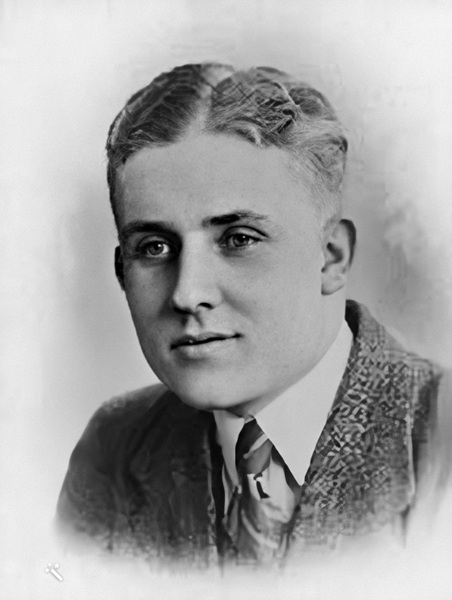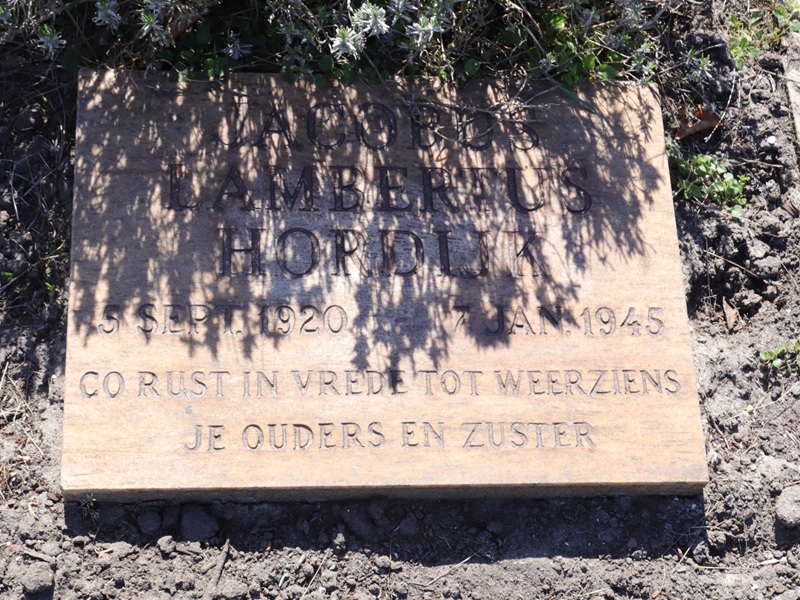Hordijk, Jacobus Lambertus
- Date of birth:
- September 5th, 1920 (Utrecht, Netherlands)
- Date of death:
- January 7th, 1945 (Limmen/North Holland, Netherlands)
- Buried on:
- Dutch Honorary Cemetery Bloemendaal
Plot: 34. - Nationality:
- Dutch
Biography
Lived in Utrecht, Egelantierstraat 122. Son of Johannes Damus Hordijk (11 October 1886 Utrecht) and Hendrika Meijer (25 July 1889 Utrecht - 2 March 1969 Maartensdijk). Unmarried. Bricklayer in his father's brick business. Dutch Reformed. Member of the resistance under the pseudonym Co van Houten and belonging to the LO of Utrecht city. In the May days of 1940 he was a soldier in the Dutch army. In 1943 Hordijk refused to return as a prisoner of war and joined the resistance.
According to Heere and Vernooij, he brought ration cards, stamps and money to people in hiding in the Zuilen neighbourhood of Utrecht every month, looked for addresses and work for new people in hiding, warned people about raids by the Arbeitskontrolldienst and acted as a courier. He also distributed the illegal newspaper ‘Voor God en den Koning’ (For God and the King). In September 1944 he became active in the Binnenlandse Strijdkrachten (Internal Armed Forces): he was involved in recruiting men for the flying brigade, acted as group commander and collected weapons, which he hid in his home.
On Saturday 2 December 1944, at around 8.30 in the evening, the Landwacht raided the family home. The man of the house sent his son and Cornelis de Haan, his future son-in-law, straight upstairs. He told one of the land guards that Co had not been home for three months. While he was still busy denying that his son was present, another land guard brought both young men into the room.
Hordijk senior was arrested along with De Haan and his son. The first two were brought back home early the next morning. But things did not look good for Co. One of the rural police had found a gun in a coat under his bed during the search. Hordijk said that he had been arrested that morning along with about a hundred others when a massive attempt had been made to steal coal from the railway. Everyone had been released that afternoon. He said he had returned to the railway premises to retrieve his bicycle and had found the gun there. The Landwacht men did not find this explanation particularly credible.
One of the landwehrmen searched the house again and this time found a German-made bayonet. ‘They sure find a lot of bayonets,’ the landwehrman remarked sarcastically. Hordijk said he had received the stabbing weapon from a certain Wesselo from 34 Hyacintstraat. He was subsequently ‘picked up’. The man denied having handed over the bayonet. Hordijk had taken the two surrendered rifles, two bayonets and two automatic pistols with accompanying ammunition to quartermaster Lankester of district IV of the Utrecht BS (1*), who had them stored in a secret hiding place.
Co had received a pistol and a bayonet from Lankester at his request. However, Lankester had urged his resistance friend not to do anything crazy with the weapons. The Landwacht search could have ended much worse, as two grenades on the upper floor and two carbines and an SS uniform under the floor had remained undiscovered. These were kept, De Haan later reported, ‘in case they were ever needed’.
Do you have more information about this person? Inform us!
- Period:
- Second World War (1939-1945)
Sources
- Photo 1: Eerebegraafplaats Bloemendaal
- Photo 2: Arjo Eijgelsheim
- - HEUVEL, C.C. VAN DEN e.a., Verzetsherdenkingskruis, Samsom Uitgeverij, 1985.
Peter H. Heere en Arnold Th. Vernooij, De Eerebegraafplaats te Bloemendaal, SDU Uitgevers, Den Haag, 2005; Nationaal Archief, Centraal Archief Bijzondere Rechtspleging, Fröhlich; Rogier van Aerde e.a., Het Grote Gebod. Gedenkboek van het verzet in LO en LKP, deel I en II, J.H. Kok NV, Kampen en H. Nelissen, Bilthoven, meerdere drukken; Comité Verzetsherdenkingskruis/C.C. van den Heuvel, W.J.C. Tensen (samenstellers), Gedenkboek Verzetsherdenkingskruis, waarin opgenomen Register Dragers Verzetsherdenkingskruis, Samson Uitgeverij, 1985; Oorlogsgravenstichting; Erelijst van Gevallenen 1940-1945; site wiewaswie.nl (waaronder overlijdensakten 10/1945 gemeente Limmen en 934/1945 gemeente Utrecht). - Eerebegraafplaats Bloemendaal





